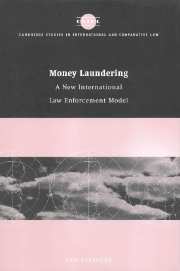Book contents
- Frontmatter
- Contents
- Preface
- Table of treaties and agreements
- List of abbreviations
- Part I New instruments in the fight against acquisitive crime: confiscation of proceeds from crime and criminalisation of money laundering
- 1 The background of the fight against money laundering
- 2 The confiscation
- 3 The fight against money laundering: genesis of a new crime
- Part II The prevention of money laundering
- Part III Jurisdiction over money laundering
- Part IV International co-operation in combating money laundering
- Epilogue
- Bibliography
- Index
- CAMBRIDGE STUDIES IN INTERNATIONAL AND COMPARATIVE LAW
2 - The confiscation
Published online by Cambridge University Press: 16 October 2009
- Frontmatter
- Contents
- Preface
- Table of treaties and agreements
- List of abbreviations
- Part I New instruments in the fight against acquisitive crime: confiscation of proceeds from crime and criminalisation of money laundering
- 1 The background of the fight against money laundering
- 2 The confiscation
- 3 The fight against money laundering: genesis of a new crime
- Part II The prevention of money laundering
- Part III Jurisdiction over money laundering
- Part IV International co-operation in combating money laundering
- Epilogue
- Bibliography
- Index
- CAMBRIDGE STUDIES IN INTERNATIONAL AND COMPARATIVE LAW
Summary
The first and most important legal tool for depriving offenders of illegal profits is confiscation of proceeds from crime. In studying the various concepts of confiscation, it is necessary to distinguish this modern type of confiscation which relates to the fruits of crime (fructum sceleris) from more traditional concepts of confiscation that relate to the instrumentalities of crime (instrumentum sceleris) or even to the subject of crime (objectum sceleris). Other relevant legal distinctions in respect of confiscation will be analysed in this part, both from the point of view of effective law enforcement and from the standpoint of the rights of the concerned parties. This analysis will, amongst others, show that, as a model of confiscation, value confiscation is to be preferred to object confiscation. It will be argued that, although confiscation of proceeds from crime is often looked upon as a civil, reparatory measure, this new type of confiscation has an inherently punitive character. The extensive use of confiscation as a source of funding for law enforcement further illustrates its non-reparatory nature. This conclusion will in turn make it necessary to investigate a number of far-reaching features of this type of confiscation. In many jurisdictions the legislation regarding confiscation of proceeds from crime can be questioned in light of human rights limitations. One very sensitive and highly debated question in this area concerns the room for reversal of the burden of proof in relation to the criminal origin of alleged proceeds from crime. It will also be argued that in rem procedures, which are popular in some jurisdictions, cannot be reconciled with the fundamental right to a fair trial.
- Type
- Chapter
- Information
- Money LaunderingA New International Law Enforcement Model, pp. 29 - 81Publisher: Cambridge University PressPrint publication year: 2000

